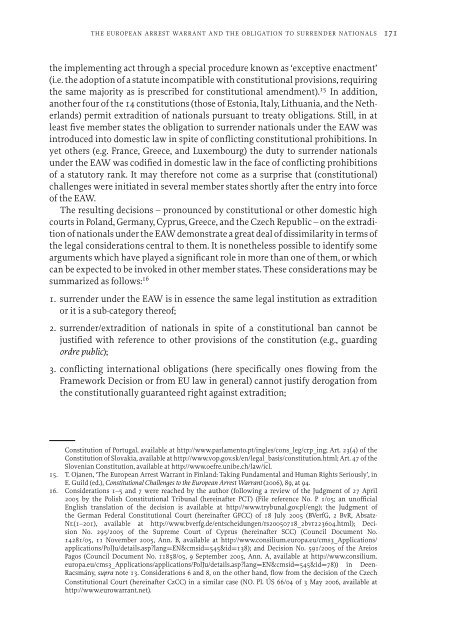Lessons of the European Arrest Warrant for Domestic ...
Lessons of the European Arrest Warrant for Domestic ...
Lessons of the European Arrest Warrant for Domestic ...
Create successful ePaper yourself
Turn your PDF publications into a flip-book with our unique Google optimized e-Paper software.
THE EUROPEAN ARREST WARRANT AND THE OBLIGATION TO SURRENDER NATIONALS 171<strong>the</strong> implementing act through a special procedure known as ‘exceptive enactment’(i.e. <strong>the</strong> adoption <strong>of</strong> a statute incompatible with constitutional provisions, requiring<strong>the</strong> same majority as is prescribed <strong>for</strong> constitutional amendment). 15 In addition,ano<strong>the</strong>r four <strong>of</strong> <strong>the</strong> 14 constitutions (those <strong>of</strong> Estonia, Italy, Lithuania, and <strong>the</strong> Ne<strong>the</strong>rlands)permit extradition <strong>of</strong> nationals pursuant to treaty obligations. Still, in atleast five member states <strong>the</strong> obligation to surrender nationals under <strong>the</strong> EAW wasintroduced into domestic law in spite <strong>of</strong> conflicting constitutional prohibitions. Inyet o<strong>the</strong>rs (e.g. France, Greece, and Luxembourg) <strong>the</strong> duty to surrender nationalsunder <strong>the</strong> EAW was codified in domestic law in <strong>the</strong> face <strong>of</strong> conflicting prohibitions<strong>of</strong> a statutory rank. It may <strong>the</strong>re<strong>for</strong>e not come as a surprise that (constitutional)challenges were initiated in several member states shortly after <strong>the</strong> entry into <strong>for</strong>ce<strong>of</strong> <strong>the</strong> EAW.The resulting decisions – pronounced by constitutional or o<strong>the</strong>r domestic highcourts in Poland, Germany, Cyprus, Greece, and <strong>the</strong> Czech Republic – on <strong>the</strong> extradition<strong>of</strong> nationals under <strong>the</strong> EAW demonstrate a great deal <strong>of</strong> dissimilarity in terms <strong>of</strong><strong>the</strong> legal considerations central to <strong>the</strong>m. It is none<strong>the</strong>less possible to identify somearguments which have played a significant role in more than one <strong>of</strong> <strong>the</strong>m, or whichcan be expected to be invoked in o<strong>the</strong>r member states. These considerations may besummarized as follows: 161. surrender under <strong>the</strong> EAW is in essence <strong>the</strong> same legal institution as extraditionor it is a sub-category <strong>the</strong>re<strong>of</strong>;2. surrender/extradition <strong>of</strong> nationals in spite <strong>of</strong> a constitutional ban cannot bejustified with reference to o<strong>the</strong>r provisions <strong>of</strong> <strong>the</strong> constitution (e.g., guardingordre public);3. conflicting international obligations (here specifically ones flowing from <strong>the</strong>Framework Decision or from EU law in general) cannot justify derogation from<strong>the</strong> constitutionally guaranteed right against extradition;Constitution <strong>of</strong> Portugal, available at http://www.parlamento.pt/ingles/cons_leg/crp_ing; Art. 23(4) <strong>of</strong> <strong>the</strong>Constitution <strong>of</strong> Slovakia, available at http://www.vop.gov.sk/en/legal_basis/constitution.html; Art. 47 <strong>of</strong> <strong>the</strong>Slovenian Constitution, available at http://www.oefre.unibe.ch/law/icl.15. T. Ojanen, ‘The <strong>European</strong> <strong>Arrest</strong> <strong>Warrant</strong> in Finland: Taking Fundamental and Human Rights Seriously’, inE. Guild (ed.), Constitutional Challenges to <strong>the</strong> <strong>European</strong> <strong>Arrest</strong> <strong>Warrant</strong> (2006), 89, at 94.16. Considerations 1–5 and 7 were reached by <strong>the</strong> author (following a review <strong>of</strong> <strong>the</strong> Judgment <strong>of</strong> 27 April2005 by <strong>the</strong> Polish Constitutional Tribunal (hereinafter PCT) (File reference No. P 1/05; an un<strong>of</strong>ficialEnglish translation <strong>of</strong> <strong>the</strong> decision is available at http://www.trybunal.gov.pl/eng); <strong>the</strong> Judgment <strong>of</strong><strong>the</strong> German Federal Constitutional Court (hereinafter GFCC) <strong>of</strong> 18 July 2005 (BVerfG, 2 BvR, Absatz-Nr.(1–201), available at http://www.bverfg.de/entscheidungen/rs20050718_2bvr223604.html); DecisionNo. 295/2005 <strong>of</strong> <strong>the</strong> Supreme Court <strong>of</strong> Cyprus (hereinafter SCC) (Council Document No.14281/05, 11 November 2005, Ann. B, available at http://www.consilium.europa.eu/cms3_Applications/applications/PolJu/details.asp?lang=EN&cmsid=545&id=138); and Decision No. 591/2005 <strong>of</strong> <strong>the</strong> AreiosPagos (Council Document No. 11858/05, 9 September 2005, Ann. A, available at http://www.consilium.europa.eu/cms3_Applications/applications/PolJu/details.asp?lang=EN&cmsid=545&id=78)) in Deen-Racsm any, ´ supra note 13. Considerations 6 and 8, on <strong>the</strong> o<strong>the</strong>r hand, flow from <strong>the</strong> decision <strong>of</strong> <strong>the</strong> CzechConstitutional Court (hereinafter CzCC) in a similar case (NO. Pl. US ´ 66/04 <strong>of</strong> 3 May 2006, available athttp://www.eurowarrant.net).
















